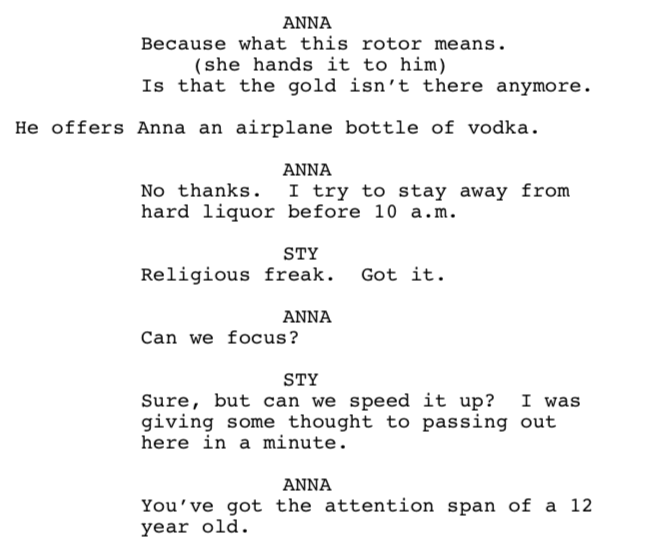Genre: Comedy
Premise: A modern-day narcissistic adventurer happens upon a clue that might lead him to the fabled lost City of Atlantis.
About: Comedy writing team Mike Arnold and Chris Poole are no strangers to outrageous manly comedies, as they popped onto the scene with the highly ranked Black List script, The Grackle, back in 2006, about a New Orleans barroom brawler who starts his own business settling disputes for people who can’t afford a lawyer. They then sold something very manly-sounding called “Captain Awesome” to Fox. And finally, Beaujolais, back in 2008. As a testament to how difficult the business is, the writers still don’t have a produced credit six years later. It just goes to show that selling a spec is not the end-all be-all. It’s just the beginning of a much tougher journey where you’re now competing with bigger hungrier fish.
Writers: Mike Arnold and Chris Poole
Details: 123 pages (3/19/08) draft
 I couldn’t think of ANY actor for this role, which might be why they haven’t made it. Joel McHale is all I’ve got.
I couldn’t think of ANY actor for this role, which might be why they haven’t made it. Joel McHale is all I’ve got.
When you hear the pitch, “The redneck version of Indiana Jones,” you sit up and pay attention. I love strange mash-ups, and truth be told you could mix anything up with Indiana Jones and I’d read it. The haunted house version of Indiana Jones. The pirate version of Indiana Jones. The Food Network version of Indiana Jones. I’m there! But something about the “redneck” slant took it to a new level. It just sounded funny.
The script follows our boisterous hero, Sty Beaujolais, a “borderline insane completely fearless” half-retard who reminds you of a cross between a young Chunk Norris and The Dos Equis guy, with a little Agent 86 thrown in for good measure. Sty is the kind of guy who hums his own theme music and wears a “mandana” signed by the great Bruce Willis.
Somehow, Beaujolais stumbles on a rare part from one of those old Enigma machines that the Nazis used to use during World War 2. And when he pairs up with the niece of his dead mentor, she becomes convinced that the part is one of three that, when used in connection with the Enigma machine, will give them the location of the lost city of Atlantis.
The problem is, his new female partner kinda hates him. As in, thinks he’s the worst human being in the world. Which is news to Beaujolais, who always operates under the assumption that all women love him.
Anyway, Beaujolais and his “romantic interest” (as he calls her) must bounce from country to country looking for these three missing Enigma parts, occasionally running into his evil nemesis, the snobby Brit, Victor Denardo, along the way. Denardo has perfected the villainous trait of waiting for the good guy to find the treasure so he can then steal it from under him.
Somewhere along the way it becomes unclear to us if they’re going after the lost City of Atlantis or just Nazi gold that was hidden after the war. But either way, Beaujolais is going all-in, like he always does, with plans to come away with the treasure, the girl, and a terribly pitched version of the closing credits song.
After finishing Beaujolais, I sat there stumped. What I’d read certainly had energy. It boasted a fun larger-than-life main character I could see an A-list comedian having fun with. The dialogue was amusing at times (ANNA: “Good. Then we’re in this together.” Sty takes this in – leaning back in his seat. STY: “Are you asking to join Sty Beaujolais on a professional adventure? In the role of the clever sidekick perhaps? Is that what you’re saying?” ANNA: “I have no idea what any of that means.” STY: “Maybe the love interest?” ANNA: “Absolutely not.”) There was even a clear goal driving the plot (find the lost city of Atlantis).
And yet I found myself bored. But I couldn’t tell if it was because the script wasn’t funny or if I didn’t find this character funny. The overly self-aware manly-main character, who’s graced the leading role in about ten specs I’ve read over the years, seems played out to me, like an extended version of the Dos Equis commercial guy.
My feeling is that there’s a reason the Dos Equis guy is in a commercial and not in a feature. People love that kind of thing for a few seconds. But can they handle it for it two hours?? It’s the McGruber Effect. McGruber is funny as a 3 minute SNL sketch, but his character isn’t built with enough weight to extend those 3 minutes to 100.
That’s the thing with comedies. When you think of them in a general sense, you imagine all the hilarity ensuing. It isn’t until you start writing, though, that you realize not every scene can be a 5 star knee-slapper. You’re going to need some scenes to set up your story, to set up your characters, to set up later situations. And, in those scenes, you’re going to need depth to draw upon. You’re going to need your character to actually give a shit.
Take a movie like There’s Something About Mary, which is VERY broad in its own right. The reason that movie works is because you love Ted (Ben Stiller). And you love Ted because of those early scenes where he’s being real. Where he’s genuinely falling in love with Mary.
Contrast that with Beaujolais, where Beaujolais is making a joke every five seconds about how he wants to bang Anna (the love interest). You know he doesn’t really like Anna. Every comment about her is a joke. So you’re never REALLY emotionally involved in whether Beaujolais is going to win her over or not. And to keep an audience’s interest, you need to be able to pull them in emotionally on SOME LEVEL.
If you want real laughs, and not just empty surface-level laughs, you need to make us care.
Does this mean it’s impossible to write a comedy that’s 100% broad humor? No, of course not. Austin Powers made three films and there wasn’t a second of sincerity in any of them. But they’re a lot tougher to pull off. And also, Austin Powers had something Beaujolais did not – variety.
Whereas it seemed like in every scene, Austin Powers was introducing some new crazy character (“Get into my belly!”) Beaujolais spends 90% of time with Beaujolais and Anna, which means we get to hear the SAME CONVERSATION over and over again. He points out how manly he is. She scoffs and tells him to pay attention to the mission. He makes a remark about how he wants to bang her. She rolls her eyes. They bicker a little, then it’s on to the next scene where this starts up all over again.
The scene between Beaujolais and Anna on page 90 is the exact same scene between Beaujolais and Anna on page 30. And you can’t have that. You need to mix up the dynamics of your relationships. You need to put your characters in new situations, situations that bring out OTHER types of jokes. We rarely saw that in Beaujolais.
Now this could all be an example of me not gelling with the humor here. Comedies, more than any other scripts, are wild cards in their journey from script to screen. Sometimes the ones that make you roll your eyes are the ones that end up being hilarious. And I may sound a little hypocritical since I’ll be first in line for Dumb and Dumber in two weeks. But I’d even made the argument there that the Farrellys took some time to ground those characters and their problems first (they ran out of money and their dream was destroyed) before getting all wacky with them. I never saw any sincerity in Beaujolais.
Still, I’d LOVE to get you comedy guys on this script to see what you think. Am I being too much of a screenplay stickler? This script was meant to be enjoyed, not analyzed! So tell me if I’m off-base. If you want to read it, let me know and I can tell you where to find it. Until then, this script was not for me.
[ ] what the hell did I just read?
[x] wasn’t for me
[ ] worth the read
[ ] impressive
[ ] genius
What I learned: In comedy, you can’t keep recycling the same joke over and over again. Look to bring in new characters or new situations that allow you to explore other aspects of your characters, and therefore different jokes.


